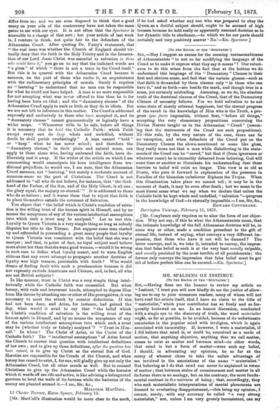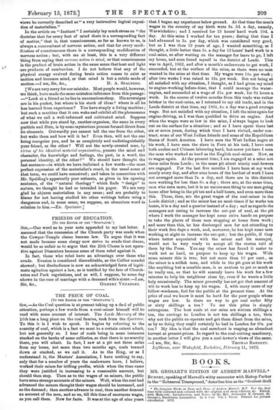lectually while the Catholic faith was unassailed. But when Sfit,—Having
done me the honour to review my article on heresy, with rude and irreverent hands, attempted to depose Him "Instinct," I trust you will now kindly do me the justice of allow- from His throne by attacking one or other of His prerogatives, it was ing me to say to your numerous readers, many of whom will not necessary to meet the attack by counter definitions. If this have read the article itself, that I have no claim to the title of had not been dene, and Anus, for instance, had gained the "materialist," which your contributor has so freely and so fre- day, what would it avail to say that "the belief which quently bestowed on ma. In an honest discussion, conducted is Christ's condition of salvation is the willing trust of the with, a single eye to the discovery of truth, the word materialist human spirit in Himself, and by no means the acceptance of any ought, as far as possible, to be avoided, because of its unfortunate of the various intellectual assumptions into which such a trust association in the popular mind with irreligion, which is again may be (whether truly or falsely) analysed "? "Trust in Him- associated with immorality. if, however, I were a materialist, if self." In whom? The Christ of Arius, or the Christ of the Catholic faith? The "intellectual assumptions" of Arius forced the Church to answer that question with intellectual definitions of her own ; and to give up those definitions, after the question has been raised, is to give up Christ as the eternal Son of God. Heretics are responsible for the Creeds of the Church, and when heresy has ceased to exist, I, for one, will gladly give up not only the Athanasian Creed, but all other creeds as well. But to counsel Christians to give up the Athanasian Creed while the heresies which it wards off are rife and active, is like advising a beleaguered garrison to level the walls of its fortress while the batteries of the enemy are planted around it.—I am, Sir, &c., I did believe that mind is, or could be, conceived as a mode of motion, that anything objective, anything that we call matter, ceases to exist as matter and becomes mind—in other words, that mind is but a form of matter—were each my belief, I should, in advocating my opinions, be so far at the mercy of whoever chose to take the unfair advantage of me involved in the associations of the name "materialist." But believing as I do that mind can never be explained in terms of matter ; that between states of consciousness and matter in all its forms there is no analogy, but on the contrary, the most funda- mental contrast in the universe of being ;--that, accordingly, they who seek materialistic interpretations of mental phenomena are doomed to everlasting disappointment,—this being my opinion, I cannot, surely, with any accuracy be called "a very strong materialist," nor, unless I am very grossly inconsistent, can my
tion of materialism."
In the article on "Instinct" I certainly lay much stress on "the doctrine that for every fact of mind there is a corresponding fact of matter," that is, that consciousness, so far as known to us, is always a concomitant of nervous action, and that for every modi- fication of cmsciounness there is a corresponding modification of nervous action ; but, with me at least, this is a very different 'thing from saying that nervous action is mind, or that consciousness is the product of brain action in the same sense that heat and light are products of combustion. I do not believe that any of the physical energy evolved during brain action ceases to exist as motion and becomes mind, or that mind is but a subtle mode of [We are very sorry for our mistake. Most people would, however, we think, have made the same mistaken inference from this passage: —"Look at a friend as he lies in unconscious sleep. His sovereigns are in his pocket, but where is his stock of ideas ? where is all he has learned from experience? You have simply a living machine ; but such a machine that it can wake and exhibit all the phenomena of what we call a well-informed and cultivated mind. Suppose now that while you stand by, another organism, the same in every particle and fibre, is by some mysterious process formed direct from its elements. Outwardly you cannot tell, the one from the other, but wake them and how will it be? Even then, will not the one being recognise you, and be as completely and undistinguishably your friend, as the other? Will not the newly-created man, by virtue of his identical material organisation, possess the mind and character, the knowledge and feelings, the past, in a word, the personal identity, of the other?" We should have thought the last sentence—in which we have italicised a few words—the most perfect expression of the materialist's creed, in the usual sense of that term, we could have conceived ; and taken in connection with Mr. Spalding's apparently poor estimate, as given in his opening sentence, of the "natural theology" which finds "design" in nature, we thought he had so intended his paper. We are very glad he abjures materialism in any sense ; and are probably to blame for not having studied his other writings before using a slangerous and, in some sense, we suppose, an obnoxious word in relation to him.—En. Spectator.]



































 Previous page
Previous page